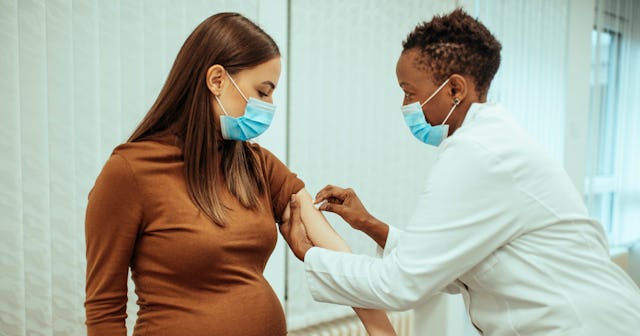New Research Points To COVID Vaccine Having No Affect On Fertility

COVID-19 vaccine does not decrease fertility, according to a new study
Since the beginning of the pandemic, scientists have been combatting misinformation about the COVID-19 vaccine left and right and one of the many bits of misinformation out there is that some people believe that the COVID-19 vaccine will hurt their future fertility. However, thanks to a very recent study, there is no evidence that the COVID-19 vaccine affects fertility whatsoever, so if you hear otherwise, it’s probably a conspiracy theory.
A new study published this week in the American Journal of Epidemiology states that the COVID vaccine does not impact fertility, but having COVID-19 definitely does affect one’s fertility.
Researchers analyzed data from over 2,100 women, between the ages of 21 and 45, over the course of a year as they attempted to get pregnant without assistance. 73% of the women and 74% of their male partners included in the research had received at least one dose of the COVID vaccine.
By the end of the period, the researchers found no link between receiving the COVID vaccine and the probability of conceiving. It didn’t matter what brand, when you got the injection prior to getting pregnant, or whether or not you received one or two does. There simply was no drop in fertility for the vaccinated bunch.
On the other hand, having a past prior COVID-19 infection did decrease fertility in men.
The researchers found that having COVID “may be associated with a short-term decline in fertility,” for male participants only. Male partners who tested positive for COVID within 60 days prior to attempted conception were 18% less likely to conceive in that menstrual cycle. There was no link between past COVID infection and future fertility for women.
“The findings provide reassurance that vaccination for couples seeking pregnancy does not appear to impair fertility,” Diana Bianchi, M.D., director of NIH’s Eunice Kennedy Shriver National Institute of Child Health and Human Development, said in a news release (via Self).
This latest research adds to the overwhelming data that vaccines are safe, especially when it comes to fertility and pregnancy. There been several studies that show that the vaccine is not linked to an increased risk of miscarriage and other studies show that the vaccine does not increase the risk of pre-term birth. Now add this new study to the mix and it’s just another reason why you should get vaccinated and boosted ASAP.